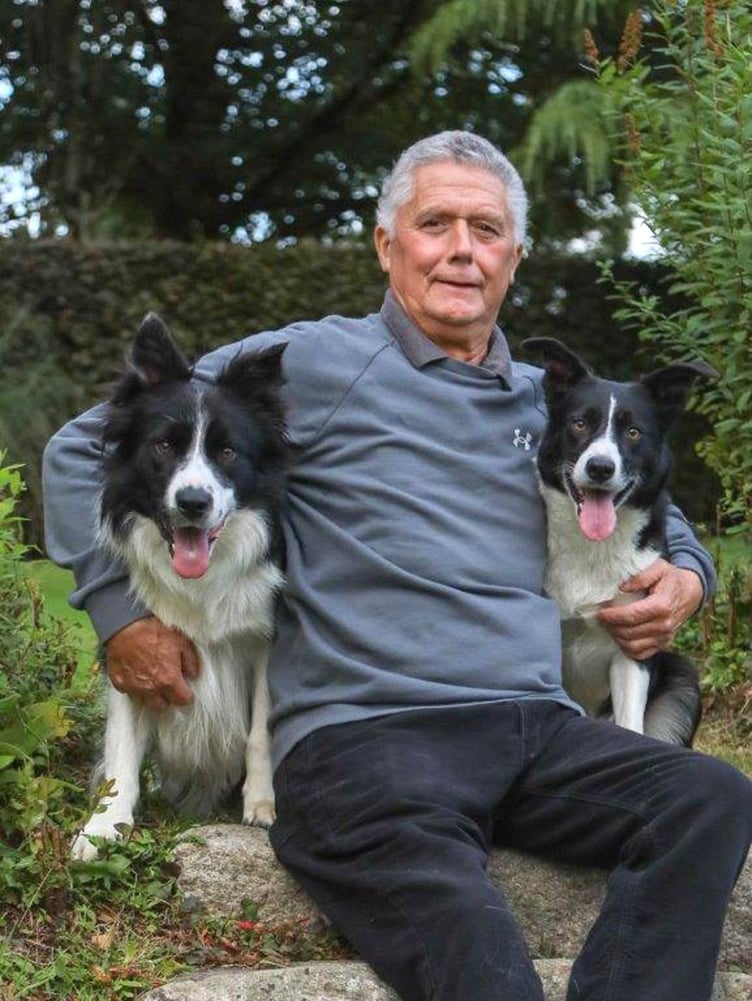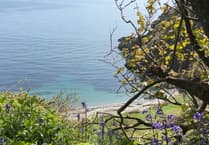The farming community has been paying tribute to Carey Dewhirst who died earlier this month after a long illness.
‘He was known for a cheeky smile and a twinkle in his eye,’ says his widow, Elaine.
He was equally well known for his passion for sheep farming and in particular for being the first to bring the Easycare breed to the island, something of which he was very proud.
The Easycare breed was first developed on the island of Anglesey in the early 1960s by farmer Iolo Owen MBE. He used predominantly Wiltshire Horns crossed with other breeds, notably the Nelson type of Welsh Mountain sheep, to produce a breed which requires minimal shepherding and veterinary care, sheds its fleece in the summer, does not need shearing and yet offers excellent meat yields and lambing ratios.
Elaine, explains how Carey first became involved with the Easycare breed.
She says: ‘Carey had seen Iolo on a television programme a long time ago and he just kept it in his head. Then, about 20 years ago, when we had the chance, and had the use of some land, we went forward with it and we ran with it.’
Other farmers in the island were sceptical about the new breed, saying that it would be too cold here for sheep that didn’t have much of a fleece, and that the wool they shed would make a mess on the ground.
In fact, the breed was already thriving in Cumbria and the shed fleece rapidly decomposes as a natural soil conditioner.
Carey and Elaine initially brought over one tup and around 20 ewes from Anglesey, then returned for some more tups and ewes and bred on from there.
Carey was a great promoter and advocate for the breed and farmers in the island really began to warm to the idea of Easycare sheep.
Due to Carey’s vision, numbers generally around the island, many of them descended from Carey and Elaine’s sheep, have increased significantly.
‘They’re just a lovely breed,’ says Elaine.
Carey’s farming journey began many years before he encountered the Easycare sheep.
When he came to the island as a youngster he started school with James Faragher whose parents, Jessie and Jack, farmed at Ballahick in Ballasalla.
The two became firm friends and the Faraghers ‘adopted’ Carey, Jessie calling him her ‘fourth son’.
Elaine says: ‘Jack Faragher was Carey’s greatest influence: his love of farming, and particularly sheep work, was formed there.’
His friendship with James continued and the two of them went on to Newton Rigg Agricultural College together, along with James’s brother Ian.
‘The place where they lived while they were there, the three lads together, was called “the Manx Embassy”,’ recalls Elaine.
And she goes on: ‘With Carey’s love of football, he commandeered a back field for a football pitch. He mowed it and then marked it all out with white lines and made two full-sized football nets out of binder twine!’
Carey and Elaine first met at the Port disco at the Falcon in Port Erin in June 1977. They started married life together in 1978 on the farm at Ellerslie where Carey had taken over from John Teare as shepherd.
Elaine says: ‘In 1979 our son Stuart was born and we lived there for a further five years. Carey worked 14 days on and two days off. It was a struggle.
‘Then we decided we wanted to buy our first house and we moved into Douglas. Carey went part-time at Ellerslie and started a window cleaning round.
‘He did that first thing in the morning, then home for lunch, and then off to the sheep in the afternoon.’
He and Elaine also started their first flock of sheep, Clun Forests, at Cly Cur farm on a tenancy from Alan and Angie Greenhalgh, whilst also running the hill sheep alongside George Costain at Ballakillowey.
Carey was also an expert sheepdog handler, and trained all his own dogs.
Elaine recalls their life back then as: ‘Hectic – a healthy life and then doing the sport in between – a fitter man than Carey you could not have had.
‘Even though he had asthma, he didn’t let that hold him back.’
She goes on: ‘I used to get the meg lambs to feed at home and many a neighbour couldn’t believe that they “heard a lamb bleating in the centre of Douglas.”
‘Then we also had the dogs and different vehicles and we realised it wasn’t the place for us to settle.’
As their sheep flock had expanded they took on Silverburn Farm from Mike and Hazel Osborn and later Richard and Vanessa Drinkwaters land at Quarterbridge and Carey and Elaine made the move out of town.
Around 30 years ago they found a bungalow near the Eary Dam with some land.
‘And what a good decision that was: it’s a lovely area with the best neighbours,’ saya Elaine.
When Carey became ill, she adds, those neighbours really rallied round, especially the ‘Winckle girls’, Rosie and Alison.
‘They have been so supportive over the years and especially since Carey’s illness progressed,’ says Elaine.
After a spell in Hospice, an organisation Elaine can’t praise highly enough, Carey was able to spend his final days peacefully at home.
There remains as his legacy a sizeable flock of pure bred Easycare sheep: ‘We’re downsizing,’ insists Elaine, ‘but I just can’t give it up’.
She also has two much-loved grandsons, Maxwell, 16 and Dexter, 10.
‘Dexter is a natural with the sheep, he really is.
‘Year after year he’ll just go and bottle feed them, no need to remind him how to do it. They’re bright boys,’ Elaine says proudly.
And she adds: ‘Carey just had the patience of a saint. He never fell out with anyone and I don’t think you’ll find anybody with a bad word to say about him.’

.jpeg?width=209&height=140&crop=209:145,smart&quality=75)

.jpeg?width=209&height=140&crop=209:145,smart&quality=75)

Comments
This article has no comments yet. Be the first to leave a comment.